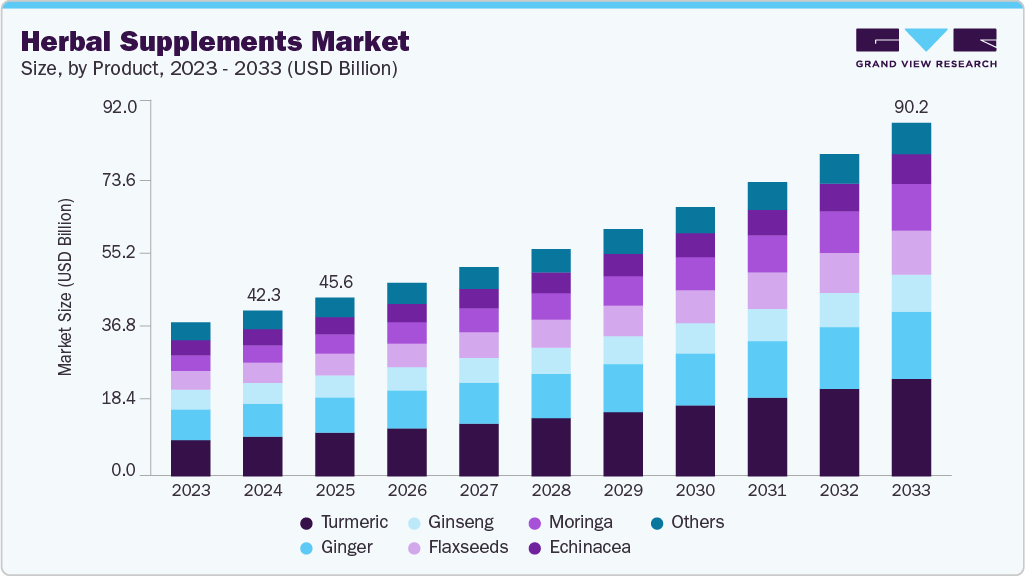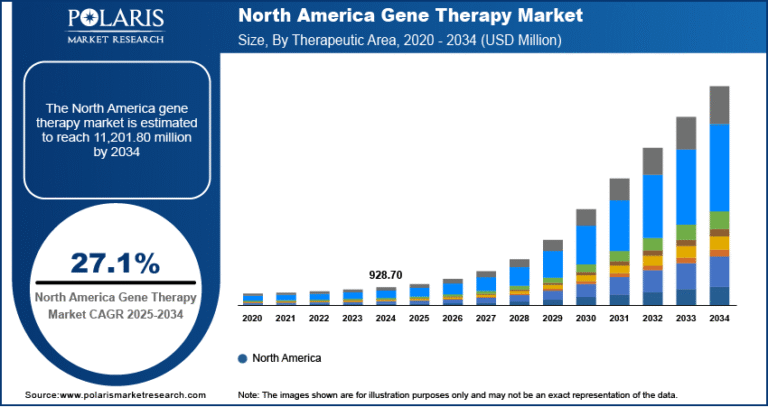Herbal Supplements Market Size, Share & Trends Analysis growing at a CAGR of 8.89% from 2025 to 2033

The global herbal supplements market size was estimated at USD 42.33 billion in 2024 and is anticipated to reach USD 90.24 billion in 2033, growing at a CAGR of 8.89% from 2025 to 2033. This growth is driven by rising consumer health consciousness, a growing preference for natural and plant-based remedies, and increasing awareness of preventive healthcare.
Key Market Trends & Insights
- The North America herbal supplements market held the largest share of 26.34% of the global market in 2024.
- The herbal supplements industry in the U.S. is expected to grow significantly over the forecast period.
- By product, the turmeric segment held the highest market share of 23.95% in 2024.
- Based on formulation, the capsules segment held the highest market share in 2024.
- By consumer, the adult segment held the highest market share in 2024.
Market Size & Forecast
- 2024 Market Size: USD 42.33 Billion
- 2033 Projected Market Size: USD 90.24 Billion
- CAGR (2025-2033): 8.89%
- North America: Largest market in 2024
- Asia Pacific: Fastest growing market
Request a free sample copy or view report summary: https://www.grandviewresearch.com/industry-analysis/herbal-supplements-market/request/rs1
Rising Health Awareness
A key driver of demand in the herbal supplements market is the growing global awareness of health, wellness, and preventive care. Consumers are becoming increasingly proactive about managing their health, opting for natural alternatives that support long-term well-being rather than relying solely on pharmaceutical treatments. This shift has fueled a surge in interest in herbal supplements, particularly those known for their functional benefits, such as boosting immunity, reducing stress, enhancing digestion, and improving sleep quality. For instance, echinacea, a popular herbal supplement, has gained significant traction due to its immune-boosting properties, especially after the recent pandemic.
This heightened health consciousness is particularly prominent among younger demographics such as Millennials and Gen Z, who actively research wellness topics online and gravitate toward holistic, plant-based products. The widespread availability of health information through social media, wellness influencers, and digital platforms has empowered consumers to make more informed choices. For instance, in November 2024, News18 India reported a significant demographic shift in Ayurveda’s global appeal. Traditionally favored by older generations, the practice is now attracting a younger, health-conscious audience, particularly Millennials and Gen Z. These individuals are increasingly drawn to Ayurveda’s holistic approach, emphasizing natural remedies, preventive care, and mind-body balance to counteract modern lifestyle stresses. Herbal supplements are increasingly viewed as a form of self-care and a lifestyle choice aligned with clean living and sustainability. As more consumers embrace natural health solutions, the demand for safe, transparent, and effective herbal supplements continues to grow, driving innovation and expansion within the market.





